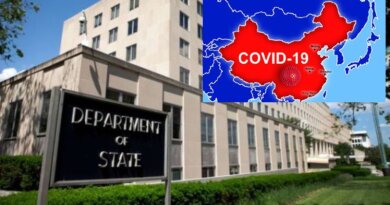China human rights lawyer convicted
Tom Mitchell in Beijing (Financial Times)
One of China’s most famous rights lawyers was given a suspended three-year term for inciting ethnic hatred and disrupting public order, his lawyer said on Tuesday, in a case that has highlighted the government’s determination to crack down on all forms of dissent.
Pu Zhiqiang, who faced a sentence of up to eight years in prison, could not be reached immediately for comment. “We argued in court that he was innocent,” said Mo Shaoping, one of Mr Pu’s two lawyers. “We do not recognise this verdict.”
“The verdict is quite disappointing,” added Qiao Mu, a friend of Mr Pu’s. “He can’t work as a lawyer after this … It also serves as a warning, reminding people that they can be jailed for their words and comments.”
Mr Pu, 50, was originally detained 18 months ago after attending a private memorial to the victims of the 1989 Tiananmen Square massacre, but the case against him was based on a series of seven tweets critical of government officials and policies.
“They clearly wanted to get him on something,” said Joshua Rosenzweig, an expert on China’s legal system. “But they seemed to have difficulty coming up with a set of charges that would really stick and be credible even within the fairly expansive notion of criminality in the Chinese legal system.”
The rights lawyer, who has defended everyone from the artist Ai Weiwei to ordinary workers, now ranks among China’s most famous dissidents alongside Nobel laureate Liu Xiaobo, fellow rights activist Xu Zhiyong and academic Ilham Tohti.
“For the next three years he’s got this sword hanging over his head,” Mr Rosenzweig added. “At any moment he’s at risk of having his probation revoked and sent back to prison.
Mr Pu’s prosecution has generated widespread condemnation from international rights groups and governments including the US and the EU, whose diplomatic representatives were not allowed to attend his trial on December 14. There was a heavy police presence at both his trial and sentencing at a courthouse on the outskirts of Beijing.
Plain clothes police, identifiable by the yellow smiley face badges they wore, roughed up Mr Pu’s supporters and foreign journalists, leading to a diplomatic protest from the UK government.
Amnesty International condemned the verdict as a “gross injustice”.
“This guilty verdict effectively shackles one of China’s bravest champions of human rights from practising law,” said William Nee, an Amnesty researcher. “Despite investigating Pu for so long, the only ‘evidence’ the authorities could muster against him were seven social media posts.”
“The authorities wanted to save face but also had to make concessions to international and domestic public opinion,” added Zhang Lifan, a Beijing-based historian. “This verdict doesn’t reflect well on the rule of law in China.”
Mr Tohti, a Muslim Uighur from the northwestern region of Xinjiang, is serving the stiffest sentence of China’s most recent crop of political prisoners, having been given life in prison for allegedly advocating independence for his home region.
Like Mr Tohti, a minorities policy expert who taught at Beijing’s Minzu University, Mr Pu was considered a moderate who sought to reform China’s political system from within.
Mr Xu and Mr Liu advocated more directly for protection of the civil rights enshrined in the Chinese constitution, which often triggers a harsh reaction from Chinese authorities.
“Pu is an iconic figure,” said Murong Xuecun, a writer and friend of Mr Pu’s. “He has upheld the spirit of the 1989 generation and in recent years devoted himself to the campaigns for free speech and human rights. He has made a huge contribution to our society.”
In one tweet, Mr Pu denounced a March 2014 terrorist attack by alleged Uighur separatists in southwestern China as “a grave sin”, but was also critical of the Chinese government’s ethnic policies in Xinjiang. “If you say Xinjiang belongs to China, then don’t treat it as a colony, don’t act as conquerors and plunderers,” he wrote. “This is an absurd national policy.”
Additional reporting by Luna Lin and Wan Li





